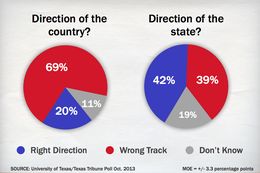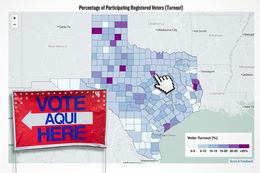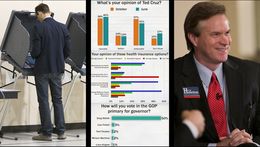The state’s new laws regulating abortion and women’s health facilities will remain an issue throughout the 2014 elections, according to nearly unanimous insiders in politics and government who answered this week’s Inside Intelligence survey.
And generally, 48 percent think the issue works to the political benefit of Texas Democrats, while only 19 percent said Republican candidates will get the biggest boost.
Should women’s health clinics close under more stringent requirements for facilities that provide abortions, voters are more likely to move toward the Democrats than the Republicans, according to the insiders; 50 percent chose Democrats on that question, while 9 percent said Republican candidates would benefit.
How about fundraising? Insiders had the same answer, with 75 percent saying Democrats will get the bigger fundraising boost from discussion of the issue as the election cycle progresses.
We collected comments along the way and a full set of those is attached. Here is a sampling:

.
Will the state’s new laws regulating abortion and women’s health centers be an issue in the 2014 elections?
• "Regardless of whether SCOTUS takes up the case, both sides will use it to their advantage (to raise money and GOTV)."
• "Wendy Davis got the exposure she wanted and clearly hopes to move beyond this issue. However, the R's will make every effort to saddle her with it."
• "But not in the way conventional wisdom expects. Democrats will talk about women's health and GOP candidates about late term abortion bans. Both positions represent majority opinion in Texas."
• "Yes, to Wendy Davis' misfortune. Democrats need to 'turn-on' people to restore their political fortunes, but they will be turning-off voters with a pro-abortion message."
• "It should be. When you hear a report that a woman was 'disappointed' that the clinic she wanted to go to for an abortion is closed and she says in a negative tone, 'oh no I guess I have to have the baby' really? These types of stories need to be highlighted by pro-life groups to show that the law is actually working."

.
As a matter of politics, do the new laws help Democratic candidates or Republican candidates?
• "Democrats and swing-voting women now know definitively that elections have consequences. They'll show up."
• "It's helps both. Repubs: see, we're trying to protect the sanctity of life. Dems: see, they hate women!"
• "It helps both. It will drive the base of both parties out. Which helps Republicans since their base is bigger."
• "In theory, there are many suburban women who usually vote Republican but who might be tempted to cross over. I'll believe it when I see it."
• "The Republican anti-abortion base voter has been given new, more restrictive laws just about every session to keep them motivated. They'll still show up on Election Day, but this time they'll be outnumbered. ."
• "Hell hath no fury like a few million women scorned. The selective hypocrisy of R extremists has literally handed Ds the moment they need to rebuild and maybe (just maybe) win."
• "Keeps Wendy Davis identified solely with abortion, rather than broadening her image."

.
If some clinics close, how will that move Texas voters?
• "There are successful women on the very edge of income-earning levels that rely on these services daily because they are limited in choices or they are contract employees with no coverage."
• "Abortions are sought by young women - a demographic with low registration and even lower turnout rates. Their impact in elections is negligible."
• "I think this depends on how the media portrays the closing of the clinics. Are we closing bad actors to protect women's health or are we closing clinics to limit women's choice? My gut feeling is that the closing of clinics will be centered around the latter."
• "Depends on how many. My bet is few will close. The providers make a lot of money, and they'll find ways to get sympathetic docs to serve. Their profits will go down a bit, but most centers will be open for business."
• "This topic has been around so long everyone that cares about this issue has picked a team."
• "Pro-choice voters will move Democrat, pro-life will move Republican, and the rest of us, who aren't single issue voters, will not be affected. By the way, those voters it 'moves' are already in their respective columns."

.
Who gets a bigger fundraising boost from the debate over abortion and women’s health?
• "Republicans get something better than money; committed primary voters!"
• "The issue of abortion restrictions has long been a pet issue for the Hollywood liberals. It will undoubtedly encourage them to write a check to help mask their degenerate lifestyle."
• "Democrats get the benefit of cash from outside the state in hopes of turning the state blue. Not enough green to turn Texas blue."
• "Passion often translates into increased fund-raising and pro-choice Democrats are nothing if not passionate about the issue. (See the Wendy Davis phenomenon already well documented). But the money will ultimately not matter if they can't use it to broaden their ideological appeal. Abortion is not a particularly attractive issue on which to build a campaign for office."
• "It's a small dollar donor thing, and the Democrats are just better at getting the small dollar donors."
• "Wendy and the Ds will bring in more out-of-state money ... which will promptly be wasted on a loss."
• "For the first election in a generation Texas will IMPORT campaign money. Thank you, HB2! Thank you, Ted Cruz!"
Our thanks to this week’s participants: Gene Acuna, Cathie Adams, Brandon Aghamalian, Jenny Aghamalian, Clyde Alexander, George Allen, Jay Arnold, Tom Banning, Dave Beckwith, Andrew Biar, Allen Blakemore, Tom Blanton, Hugh Brady, Chris Britton, David Cabrales, Raif Calvert, Lydia Camarillo, Kerry Cammack, Thure Cannon, Snapper Carr, Janis Carter, Corbin Casteel, William Chapman, Elna Christopher, Harold Cook, Kevin Cooper, Chad Crow, Beth Cubriel, Randy Cubriel, Denise Davis, Hector De Leon, June Deadrick, Nora Del Bosque, Holly DeShields, Tom Duffy, Richard Dyer, Jeff Eller, Jack Erskine, John Esparza, Jon Fisher, Dominic Giarratani, Stephanie Gibson, Eric Glenn, Kinnan Golemon, Daniel Gonzalez, John Greytok, Jack Gullahorn, Clint Hackney, Anthony Haley, Wayne Hamilton, Bill Hammond, Richard Hardy, Ken Hodges, Steve Holzheauser, Kathy Hutto, Deborah Ingersoll, Cal Jillson, Jason Johnson, Mark Jones, Robert Jones, Lisa Kaufman, Robert Kepple, Richard Khouri, Tom Kleinworth, Sandy Kress, Nick Lampson, Pete Laney, Bill Lauderback, Dick Lavine, Luke Legate, Leslie Lemon, Ruben Longoria, Vilma Luna, Matt Mackowiak, Luke Marchant, Dan McClung, Mike McKinney, Robert Miller, Bee Moorhead, Mike Moses, Keir Murray, Pat Nugent, Todd Olsen, Nef Partida, Gardner Pate, Robert Peeler, Jerry Philips, Tom Phillips, Wayne Pierce, Richard Pineda, Allen Place, Gary Polland, Jay Propes, Bill Ratliff, Karen Reagan, Patrick Reinhart, David Reynolds, Grant Ruckel, Jason Sabo, Andy Sansom, Jim Sartwelle, Stan Schlueter, Bruce Scott, Robert Scott, Christopher Shields, Jason Skaggs, Ed Small, Todd Smith, Larry Soward, Leonard Spearman, Dennis Speight, Jason Stanford, Bill Stevens, Colin Strother, Charles Stuart, Michael Quinn Sullivan, Sherry Sylvester, Gerard Torres, Trey Trainor, Vicki Truitt, David White, Darren Whitehurst, Woody Widrow, Seth Winick, Alex Winslow, Peck Young, Angelo Zottarelli.














